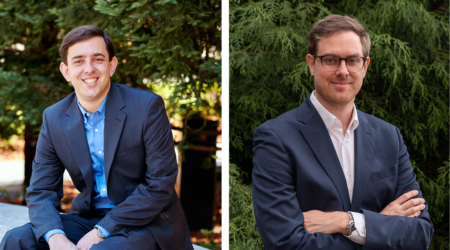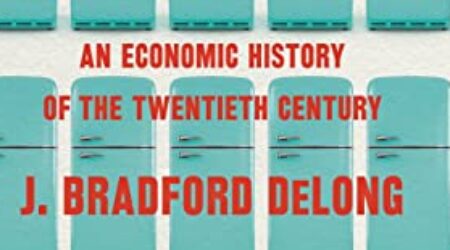On Friday, September 9, 2022, Social Science Matrix hosted an “Authors Meet Critics” panel discussion on the book The Government of Emergency: Vital Systems, Expertise, and the Politics of Security, by Stephen Collier, Professor in the UC Berkeley Department of City and Regional Planning, and Andrew Lakoff, Professor of Sociology at the University of Southern California. This new book looks back to the 20th century to explore how experts and officials have come to approach challenges like pandemics and cyberattacks as catastrophic risks that demand a constant state of preparedness.
The authors were joined in conversation by Cathryn Carson, Chair of the UC Berkeley Department of History, and Michael Watts, Class of ‘63 and Chancellor’s Professor of Geography Emeritus at UC Berkeley. The panel was moderated by Aihwa Ong, Professor Emerita at UC Berkeley. The panel was co-sponsored by Global Metropolitan Studies.

“The current series of relentless crises raises questions about the nature and scope of the government of modern living,” Ong said in her opening remarks. “We know the welfare state can barely keep up with the proliferation of uneven life chances across the world. Meanwhile, governments are menaced by countless known and unknown threats looming on the horizon. So how can catastrophic events be predicted, regulated, or even tamed? How did a sense of vulnerability develop in the United States? Do the expertise of emergency and politics of precarity protect the living, or are they merely experiments with our fragile future? These are some of the themes dealt with by The Government of Emergency.”

Andrew Lakoff introduced the book by explaining that its central themes emerged from an initial “puzzle” related to modern life in the United States. “Although most of the book is based on historical material from the mid-20th century, our research actually began with a puzzle in the present,” Lakoff explained. “We were looking into novel formations of security in the United States in the early 2000s, in the aftermath of 9-11 and the anthrax attacks that followed — formations like biosecurity and homeland security. We came upon a series of government plans, strategy documents, think tank reports, and so on, which we could not make sense of in terms of familiar understandings of collective security, whether national defense or social welfare. These plans and programs were not oriented to the defense of national territory against an external enemy, nor toward managing problems of population security, like endemic disease or poverty — the traditional task of biopolitics. Rather, they focused on potential future events whose probability from the perspective of the experts charged to deal with them was difficult to calculate, but whose consequences might be catastrophic — not only terrorist attacks, but also natural disasters, environmental accidents, or outbreaks of infectious disease.”
The goal of the governmental plans, Lakoff said, was to “ensure the ongoing function of critical infrastructures — systems of transportation, energy, food, water, and communication — in the aftermath of such potential events. And they generated knowledge about the vulnerability of these systems and how to mitigate this vulnerability, not through the analysis of patterns of incidents in the past… but rather through techniques of imaginative enactment, such as scenario-based exercises, computer simulations, or catastrophe models…. We came to call this formation of expert knowledge and political administration ‘vital systems security,’ in contrast to sovereign state security or population security. And we found elements of its guiding practices not only in federal agencies like the Department of Homeland Security or the CDC, but also in local emergency management offices, as well as in multilateral organizations like the World Health Organization.”
“Vital systems security is arguably one of the dominant governmental rationalities of our time,” Lakoff said. “Of course, to say that it is dominant is not to say that it is successful in achieving its aims. Indeed, it more typically fails. But crucially, it provides norms such as ‘resilience’ and ‘preparedness,’ against which such failure is measured. And it is mostly taken for granted as a political obligation, even as it continually fails.”
The scholars approached their research not as history, but as “geneaology,” Lakoff explained, tracing the lineage of systems put in place over the past several decades. “We looked for moments in which what are now fairly ubiquitous expert techniques and governmental practices were invented, often for other purposes, and we traced how they were gradually assembled into a coherent schema or apparatus,” he said.

In his remarks, Stephen Collier provided a more detailed overview of the content of the book, which chronicles the emergence of “vital systems security” from the era prior to World War II. “Through World War II, emergency government was about the management of economic crises — whether economic downturns, industrial strikes, or mobilization for war,” Collier said. “By the late 1950s, emergency government had come to refer to something quite different. Namely, it came to refer to preparedness for a future event that disrupts the vital systems upon which modern life depends. The book shows how vital vulnerable systems came into being, or at least became the objects of sort of systematic knowledge and management for the first time. And this event in thought corresponded to the emergence of new ways of acting and governing in particular.”
The first section of the book, Collier explained, covers the period roughly from the early 1930s to 1945, an era marked by the Depression and World War II, when experts (primarily economists) “assembled a novel knowledge infrastructure” for mapping and managing vital systems. At the same time, a group of government reformers created new methods for managing ongoing emergency situations.
“A central challenge for these reformers was the one that was most famously formulated by Carl Schmitt, the German jurist, who was an explicit point of reference for some of the Reformers that we traced in this part of the book — namely, can liberal constitutional democracies manage crisis situations and remain democratic?” Collier explained. “In response, these reformers devised a set of mechanisms for governing emergencies that they thought were compatible with democracy. These were things like the delegation of legislative authorities to the executive, and the use of so-called ‘reorganization power,’ through which the president could create administrative agencies and other apparatuses to manage emergency situations.”
The second part of the book, Collier said, addresses the period between 1945 and the early 1950s, when “many of the actors and government offices that were involved in mobilization turned to a new problem, which was the prospect of a Soviet attack on American vital systems, using airplanes, long-range bombers, and atomic weapons…. The problem of emergency government was being beginning to shift during this period. Rather than managing a specific, ongoing crisis, it was mutating into an ongoing task of preparedness for a future catastrophe that might arise at any moment.”
This evolution continued, Collier explained, as the focus of emergency government shifted from mobilization planning toward a new mindset of constant emergency preparedness or emergency management. “The ‘government of emergency,’ which is understood not as a kind of sporadic task that emerges during specific crises, but an ongoing task of preparedness, had become an obligation of the government,” Collier said. “We think of this mutation of emergency government — and the creation of what we refer to in the book as an emergency state — as a very significant episode in American political development.”

In his commentary, Michael Watts noted that The Government of Emergency’s central themes are deeply resonant in the era of climate change, pandemics, and other threats. “If you needed a ringing endorsement of the relevant saliency of emergency government on a global scale, take a look at the World Economic Forum’s annual Global Risk Report,” Watts said. “It’s an annual inventory and compendium of all of these vulnerabilities inherent in vital systems and the forms of emergency government, what they call effective mitigation, that we do or do not have. That report says that the most effective and currently well-established mitigation measures are in the realms of — wait for it — financial stability and weapons of mass destruction.”
“What I liked about the book was that it really does delve into the innards of the security state and Cold War bureaucratic,” Watts said. “Any authors that are prepared to take on a 47-volume strategic bombing survey, which they do, I hold in the highest regard. The granularity of the narrative is compelling, but they’re always tacking back to look at how the logics of future catastrophe run aground, or confound some of the founding principles and ideological convictions of American politics and political economy.”

Cathryn Carson — a historian whose work focuses on the 20th century and the rise of nuclear weapons — described the book as “incisive, careful, and far-seeing.” She said that she regarded The Government of Emergency “as a story of the conceptualization and ordinary practice of securing threatened infrastructures, the ones that sustain collective life in modern societies.”
“The subject matter of the book is nominally the systems of industrial and urban modernity, not just how they grow or get built and crumble over time, but the possibilities of catastrophic breakdown and the cascading social failures that follow,” Carson said. “And then you pay attention to the emerging expectation that it’s the responsibility of government to respond to and mitigate and, probably most important, prevent, as far as possible, that kind of breakdown, through a kind of prophylactic planning called preparedness.”
Carson hailed the book’s examination of the infrastructure of “vital systems, the multi-layered and complex systems that sustain urban and industrial life, which is itself a mid-20th century notion of systems. And then you look at those systems’ vulnerability, and the counter-move of preparedness that you wrap up in the term ‘security’ — a term with meanings far beyond this text.”
Carson said that the book gives new shape to our traditional understanding of the Cold War. “As a historian, I want to say I am deeply impressed by the history in here,” she said. “What you show us is how civil defense strategies, which historians have written about, actually come out of things like supply chain management, those techniques of the 1930s and 1940s, the new sciences of administration…. To me, it’s simply good history.”


